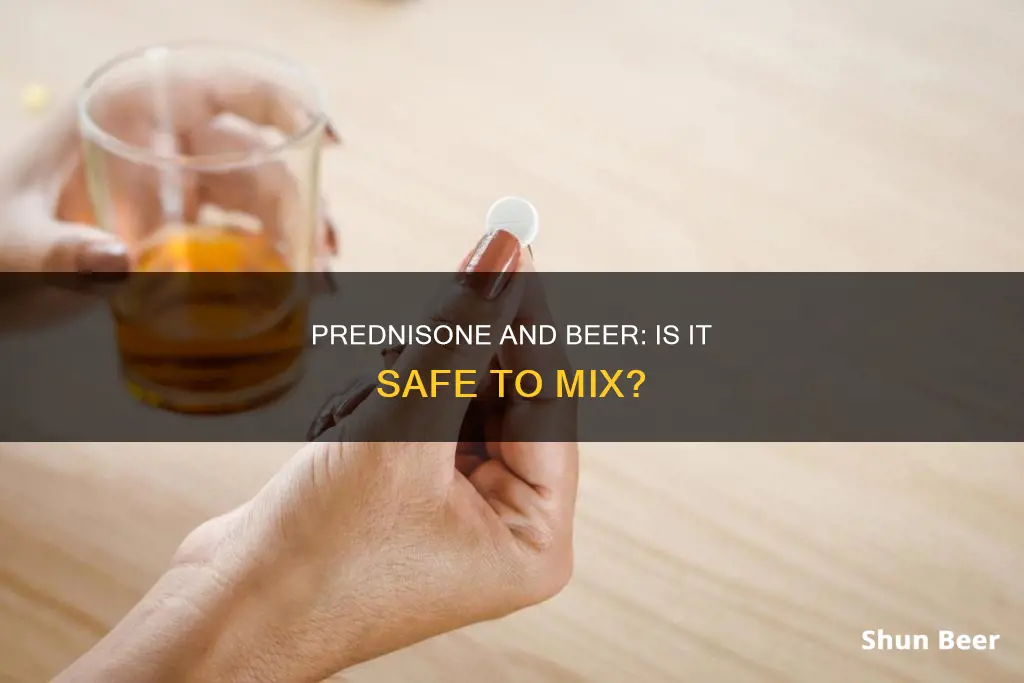
Prednisone is a corticosteroid used to treat inflammatory conditions, such as rheumatoid arthritis, multiple sclerosis, lupus, and asthma. It is a strong anti-inflammatory medication that suppresses the immune system, reducing swelling and irritation. While prednisone can be beneficial, it can also have strong side effects, such as gastrointestinal issues, weakened immunity, and mental health changes. As both prednisone and alcohol suppress the immune system, taking them together can increase the risk of infections and cause a delay in treatment. Additionally, alcohol can worsen some of the side effects of prednisone, such as gastrointestinal problems, weakened bones, and changes in blood sugar levels. Therefore, it is generally recommended to limit alcohol consumption or abstain from drinking altogether while taking prednisone to avoid potential complications and adverse effects. Consulting a healthcare professional is essential to determine if and how much alcohol can be consumed safely during prednisone treatment.
| Characteristics | Values |
|---|---|
| Alcohol-Prednisone Interaction | No direct interaction between alcohol and prednisone |
| Prednisone | Synthetic form of an adrenocortical steroid |
| Alcohol | A depressant |
| Side Effects | Gastrointestinal issues, weakened immunity, mental health changes, high blood pressure, weakened bones, electrolyte imbalances, altered blood sugar levels, weight gain |
| Risk Factors | Dosage of prednisone, length of treatment, frequency of alcohol consumption, existing medical conditions |
| Precautions | Consult a doctor, avoid stimulants, take prednisone with food |
What You'll Learn

Potential risks of drinking alcohol with prednisone
While there is no direct drug interaction between prednisone and alcohol, mixing them together is generally not recommended. This is because prednisone and alcohol have similar effects on the body, and taking both simultaneously can increase the risk of these side effects occurring or becoming more severe.
Increased risk of infection
Both alcohol and prednisone suppress the immune system, making it harder for the body to fight off infections. Consuming alcohol while taking prednisone can further increase the risk of infection and make it more difficult to recover from one. This effect is especially pronounced in individuals taking steroids long-term.
Gastrointestinal problems
Prednisone can increase the risk of gastrointestinal disturbances, such as an upset stomach. Long-term alcohol use can cause inflammation of the stomach lining, leading to stomach ulcers, heartburn, and malnutrition. Combining prednisone and alcohol can exacerbate these issues, especially in individuals with existing stomach problems.
Blood sugar changes
Alcohol can cause blood sugar levels to drop, which can be dangerous for individuals with diabetes. Additionally, prednisone can increase blood sugar levels, and when combined with alcohol, may further elevate the risk of developing type 2 diabetes.
Bone weakening
Long-term use of prednisone has been associated with weaker and more brittle bones, leading to an increased risk of osteoporosis. Alcohol consumption is also a risk factor for osteoporosis due to the loss of nutrients necessary for bone growth. Therefore, drinking alcohol while taking prednisone may further increase the risk of bone-related issues.
Weight gain
Alcohol intake has been linked to weight gain in some individuals, and weight gain is also a possible side effect of prednisone. Combining alcohol and prednisone may increase the likelihood of weight gain.
Other risks
Other potential risks of combining alcohol and prednisone include dehydration with electrolyte imbalances, impaired wound healing, adrenal gland suppression, and pancreatitis (inflammation of the pancreas).
The Magic of Appearing Beer: Trick Explained
You may want to see also

Side effects of drinking alcohol with prednisone
While there is no direct drug interaction between prednisone and alcohol, it is not advisable to mix the two. This is because prednisone and alcohol share similar side effects, and consuming them together may increase the risk of experiencing these side effects.
Prednisone is a corticosteroid used to treat a wide range of health issues, from blood and skin disorders to allergies, infections, and certain types of cancers. It is also used to prevent organ rejection following a transplant and to treat inflammatory bowel diseases such as ulcerative colitis and Crohn's disease. Prednisone works by suppressing inflammation and the immune system, making it useful for treating autoimmune conditions.
Immune System Suppression
Both alcohol and prednisone can suppress the immune system, making it harder for the body to recover from illnesses and fight infections. Combining them can further increase the risk of infections and prolong recovery. This effect is especially pronounced in older adults, who may have a higher risk of complications when mixing alcohol and prednisone.
Upset Digestive Tract
Alcohol and prednisone can both irritate the digestive tract and cause peptic ulcers. Consuming them together can exacerbate these issues, especially for individuals prone to stomach problems or indigestion. Additionally, alcohol can increase the risk of stomach ulcers and bleeding, especially when consumed in high amounts.
Osteoporosis
Prednisone has been linked to bone thinning and an increased risk of osteoporosis. Excessive alcohol consumption has also been associated with a higher risk of osteoporosis and bone fractures. Therefore, drinking alcohol while taking prednisone may further increase the risk of bone-related issues.
Changes in Blood Sugar Levels
Prednisone can disrupt blood sugar levels, and when combined with alcohol, this effect may be enhanced. People taking prednisone, especially those at risk of developing type 2 diabetes or with a history of long-term steroid use, may experience elevated blood sugar levels beyond the threshold for diabetes. Alcohol can also increase blood sugar levels, and consuming more than one or two drinks per day while taking prednisone further increases the risk of type 2 diabetes.
Weight Gain
Prednisone and alcohol can both contribute to weight gain. Prednisone can increase appetite and affect the metabolism of different nutrients, leading to increased fat deposits. Alcoholic drinks are often high in calories, and excessive alcohol consumption can promote weight gain. Therefore, mixing prednisone and alcohol may exacerbate weight gain.
High Blood Pressure
Prednisone and alcohol can also affect blood pressure. Prednisone can increase fluid and electrolyte retention, leading to increased blood volume and potentially higher blood pressure. Alcohol consumption can also influence blood pressure, with studies suggesting that it can decrease blood pressure initially and then increase it later. Therefore, mixing prednisone and alcohol may have a cumulative effect on blood pressure.
In summary, while occasional light drinking may not lead to severe side effects, heavy or frequent alcohol consumption can negatively impact the effectiveness of prednisone and increase the risk of adverse effects. It is always advisable to consult a healthcare professional before consuming alcohol while on prednisone treatment to discuss potential side effects and drug interactions. Abstaining from alcohol during the treatment period is generally recommended.
Krups Beertender: Compatible With Other Beers?
You may want to see also

Who is at greater risk when drinking alcohol with prednisone?
While there is no direct drug interaction between prednisone and alcohol, mixing them is generally not recommended, as it may increase the risk of experiencing intensified side effects.
Although anyone taking prednisone may experience intensified side effects when mixing it with alcohol, certain individuals are at a higher risk for complications. These include:
- Older adults: Age affects how alcohol impacts the body, and older adults may find that smaller amounts of alcohol affect them more than younger adults.
- Women: Women tend to have less water in their bodies and produce fewer enzymes to break down alcohol, leading to higher blood alcohol levels. As a result, they may be more susceptible to the negative effects of drinking.
- Individuals with existing health conditions: Those with existing health issues, such as gastrointestinal disorders, osteoporosis, or diabetes, may experience worsened side effects when combining alcohol and prednisone.
- Heavy drinkers: Individuals who consume higher amounts of alcohol (3 drinks or more per day) are at an increased risk of bone fractures and other health complications when mixed with prednisone.
- Long-term prednisone users: Taking prednisone for extended periods can lead to lower bone mineral density and a higher risk of osteoporosis and fractures. Combining this with alcohol can further increase the risk of bone-related issues.
Miller Beer Text Rebates: How Do They Work?
You may want to see also

How long after taking prednisone can you drink alcohol?
While there is no direct drug interaction between prednisone and alcohol, mixing them is not recommended. This is because prednisone and alcohol have similar effects on the body, and combining them may increase the risk of certain side effects.
Prednisone is a corticosteroid used to reduce inflammation or suppress the immune system. It is often prescribed to treat various diseases, including asthma, lupus, multiple sclerosis, arthritis, and Crohn's disease. The drug can be taken for short or long periods, depending on the condition being treated.
Alcohol can worsen some of the side effects of prednisone, such as changes in blood sugar levels, damage to the stomach and digestive tract, dehydration, immune system suppression, impaired wound healing, and osteoporosis. Additionally, both prednisone and alcohol can suppress the immune system, increasing the risk of infections.
The risk of side effects when mixing prednisone and alcohol depends on several factors, including the dosage of prednisone, the length of treatment, the amount of alcohol consumed, and any existing medical conditions. For example, people with gastrointestinal disorders, osteoporosis, or diabetes may be more susceptible to adverse effects.
In general, it is recommended to limit alcohol consumption when taking prednisone. If you are taking prednisone for a short period, you may need to wait a few weeks or months after finishing the treatment before consuming alcohol. However, if you are taking prednisone for a long-term chronic condition, you may need to avoid alcohol completely.
It is always best to consult your doctor or healthcare provider before consuming alcohol while taking prednisone, as they can determine whether it is safe for you based on your specific situation. They can also advise you on when it is safe to drink alcohol after completing your prednisone treatment.
Honey's Magic in Beer: The Science Behind It
You may want to see also

Precautions to take when drinking alcohol with prednisone
While there is no direct drug interaction between prednisone and alcohol, mixing them is not recommended as prednisone may change the effects of alcohol on the body, or vice versa. Here are some precautions to take if you are drinking alcohol while taking prednisone:
- Consult a doctor before drinking alcohol while taking prednisone. A doctor will be able to advise on whether it is safe to mix the two substances based on factors such as dosage, length of treatment, frequency of alcohol consumption, and other medical conditions.
- Be aware of the potential side effects. Both substances can suppress the immune system, and combining them may increase the risk of infection or delay recovery from one. Other possible side effects include gastrointestinal problems, weakened bones, weight gain, and blood sugar changes.
- Limit your alcohol consumption. The more alcohol you drink, the higher the risk of negative side effects. Even occasional binge drinking can disrupt the immune system.
- Be cautious if you have certain medical conditions. Older adults, women, and people with existing health conditions may be more susceptible to the negative effects of alcohol and may therefore be at higher risk when combining it with prednisone.
- Avoid alcohol if you have stomach issues. Both substances can irritate the stomach and digestive tract, so consuming them together may cause discomfort, especially if you are prone to indigestion or an upset stomach.
- Consider abstaining from alcohol altogether. Given the potential risks, it may be best to avoid alcohol completely while taking prednisone.
Beer Distribution in Georgia: A Complex System Explained
You may want to see also
Frequently asked questions
It is not recommended to drink alcohol while taking prednisone. Although there is no direct drug interaction between the two, prednisone and alcohol have similar side effects, and consuming them together can increase the risk of these side effects occurring. These side effects include weakened immunity, gastrointestinal issues, mental health changes, high blood pressure, weakened bones, electrolyte imbalances, altered blood sugar levels, and weight gain.
The risks of drinking alcohol while taking prednisone include an increased likelihood of infections, gastrointestinal problems such as stomach irritation or ulcers, impaired wound healing, the development of type 2 diabetes, weakened bones or osteoporosis, and changes in blood sugar levels.
If you choose to consume alcohol while taking prednisone, it is important to consult a healthcare professional first as the combination of substances can cause problems. It is generally recommended to limit your alcohol intake and avoid excessive or frequent drinking, as this can affect the treatment outcomes and the body's response to prednisone. Discuss your specific situation with your doctor to determine if an occasional drink might be safe for you.







